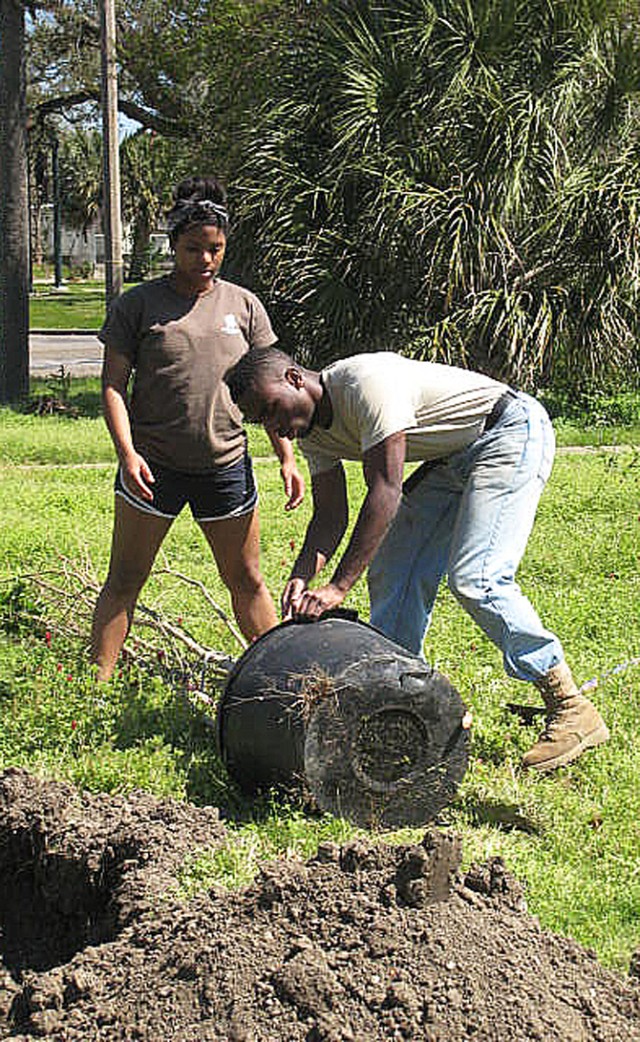
WEST POINT, N.Y. (April 6, 2011) -- For the fourth consecutive year following Hurricane Katrina in 2006, cadets embarked on an alternative spring break to assist the city of New Orleans in its continuing effort to recover from the devastating effects and after-effect of the storm.
This year, seven cadets (Class of 2013 Cadets Shelby Kincaid, Janae Bell and Sarah Pendergraft, and Class of 2014 Cadets Alecia Moore, Joshua Capers, Stefani King and Shelby Jackson); two sociology faculty members (Col. Irving Smith and Bruce Keith, Ph.D.) and a member of the Class of 2007, Capt. Dave Mudek, who participated in the first alternative spring break and has taken leave annually to join the West Point contingent during each of the last three trips, continued the work to help bring back the beauty of the city.
The joint venture between the Department of Behavioral Sciences and Leadership sociology program and the Directorate of Admissions allows cadets to participate in a service learning project involving the ongoing revitalization of green spaces in city neighborhoods and the opportunity to share the benefits of a West Point education with residents of New Orleans.
Since 2007, 31 cadets and four faculty members have volunteered more than 1,400 hours to revitalize city boulevards, which has helped to ensure that the city remains a viable place to live.
During each of the four visits, the cadets landscaped green spaces in the Lakeview and Gentilly neighborhoods and select areas around the lake front. In total, more than 3,000 trees and shrubs were planted throughout the city by the West Point contingent and the group has taken a lead in organizing other groups of student volunteers.
"There was something about the atmosphere and the spirit of the people in New Orleans--it truly inspired me and made me feel like I made a difference," Moore said.
This year, in addition to planting 300 more trees, the cadets spent an hour with U.S. Congressman Cedric Richmond (D-LA), and participated in a four-hour tour with the Army Corps of Engineers to review the design and extensive reconstruction of the levee system around New Orleans.
They also discussed the benefits of a West Point education with students from local schools, and participated in a Science, Technology, Engineering and Mathematics workshop with high school students involving the West Point Bridge Design website. Additionally, and quite serendipitously, the cadets had a happenstance encounter with the Reverend Jesse Jackson at the NOLA international airport.
While the New Orleans' City Council has routinely issued officially signed proclamations to participating cadets in recognition of their dedication and commitment to the city, the West Point volunteers were formally recognized in 2008 by representatives of the Louisiana State Legislature in a ceremony preceding the Army-Tulane football game and a permanent plaque was placed in the boulevard at the intersection of Canal and Harrison streets in the Lakeview neighborhood.
"The city is extremely proud of its relationship with West Point and truly values the friendships we have made over the last four years," Al Petrie, a long-term resident of New Orleans and one of the group's regular sponsors, said. "We are getting many calls and comments from everyone in the area about how great the boulevards look."
Perhaps Morten Ender, Ph.D., a sociology faculty member involved in planning the initial trip to NOLA, best captured the essence of the alternative spring break experience.
"Community service-learning is a win-win-win situation--cadets win by learning and doing, faculty win by teaching in situ and communities win by getting work done," he said. "Our efforts made New Orleans a better place and, in the process, we made ourselves better individuals and, notably, better Americans."

Social Sharing